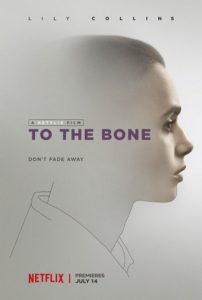Review| To The Bone
 It’s very apparent when you watch To The Bone that this story is authentic and extremely real to the people who are telling it. While difficult to watch at times, and I can imagine especially so for anyone who is intimately acquainted with eating disorders, the film is also important – it deals with the reality of the disease honestly, and given the fact that the disease is so pervasive and it impacts so many people, it’s a worthy watch.
It’s very apparent when you watch To The Bone that this story is authentic and extremely real to the people who are telling it. While difficult to watch at times, and I can imagine especially so for anyone who is intimately acquainted with eating disorders, the film is also important – it deals with the reality of the disease honestly, and given the fact that the disease is so pervasive and it impacts so many people, it’s a worthy watch.
When we meet Ellen we can tell she’s been there done that with rehab. At the beginning of the film we are dropped right into the middle of her battle with anorexia. She’s tired of sitting through the same counseling sessions, having the same conversations, hearing the same truisms. She’s cynical and puts on a tough act. It seems like she might even enjoy scaring people when they see how skinny she is.
Instead of being supported by her family, their solution to Ellen’s problem is to admit her to the next best recovery program so that they don’t have to deal with it, deal with her. Her dad is absent, her stepmother is overbearing, and her mother is so consumed with her own life that she often makes Ellen’s struggle about her. Ellen sums up perfectly what she believes and how her family often treats her when she says “I’m sorry I’m no longer a person, but a problem.”
Though her family treats her like a burden instead of someone in desperate need of help, Ellen’s relationship with her family is far from one-dimensional. We get to see the pain it causes them too. Her sister constantly pleads with her to get healthy. At one point in the film her mom says through tears, “it’s like she’s dying right in front of us.”
 In what seems like a last ditch effort to help Ellen get better, her stepmom and dad enroll her in yet another rehab program. The doctor, played by Keanu Reeves, is considered the best, though his practices are considered unorthodox. Ellen goes through the motions when she first arrives at this small, in-patient group home, expecting it to be like all the rest, but this time she starts to make some real connections.
In what seems like a last ditch effort to help Ellen get better, her stepmom and dad enroll her in yet another rehab program. The doctor, played by Keanu Reeves, is considered the best, though his practices are considered unorthodox. Ellen goes through the motions when she first arrives at this small, in-patient group home, expecting it to be like all the rest, but this time she starts to make some real connections.
As Ellen goes deeper with her housemates and even Dr. Beckham, we realize how important a supportive community is in the healing process on the path to recovery. It turns out the path to recovery happens slowly, with small victories and small steps. Just chewing food and then spitting it back out is a big step forward.
To the Bone is like a crash course on eating disorders. In fact, there is an advisory before the film begins, letting people know that the film might be a “trigger” for some viewers. The director, Marti Noxon, and lead actor, Lily Collins, both struggled with Anorexia Nervosa in their pasts.
I knew very little about the disease myself, so I did some research and learned that Anorexia is the third most common chronic disease among young people. I was also shocked to find out that males represent 25% of individuals with Anorexia Nervosa, and they are at a higher risk of dying, in part due to the fact that they are often diagnosed later since many people assume males don’t have eating disorders. Additionally, and probably most shocking: anorexia has the highest death rate of any psychiatric disorder.
 At the end of the day anorexia, like most mental illness, is a battle for life. It is a struggle to believe that life matters and is worth fighting for. It’s a battle against the lie that you don’t matter, that your life doesn’t amount to anything. Anorexia is just one of many ways people try to numb their pain and drown out cyclical thoughts. That is ultimately what makes Ellen’s experience in the group home different, they help her to see that life is worth living.
At the end of the day anorexia, like most mental illness, is a battle for life. It is a struggle to believe that life matters and is worth fighting for. It’s a battle against the lie that you don’t matter, that your life doesn’t amount to anything. Anorexia is just one of many ways people try to numb their pain and drown out cyclical thoughts. That is ultimately what makes Ellen’s experience in the group home different, they help her to see that life is worth living.
This film, despite its harsh realities, helps its characters, and in turn the audience, see that there is hope, and life is worth fighting for. As a Christian watching this movie, it was a great reminder that we have an even greater hope as believers because we have someone to live for. Anorexia in many ways is like other struggles and addictions or “weight and sin which clings so closely.” (Hebrews 12:1) Just like the Christian life on the road to glory, change happens slowly over time, not overnight.
Ultimately, the film falls short in its resolution. Ellen receives the counsel that she is strong enough. She doesn’t need saving. The conclusion we are meant to draw is that Ellen just needs to come to the end of herself – see on her own that life is worth living, but without a greater hope it’s an empty promise. People fail us. Treatments fail us. Truisms fail us, but Jesus is the true Healer and Savior. He is the only thing that can fill the void to make us know that we are enough. He died to prove it.







